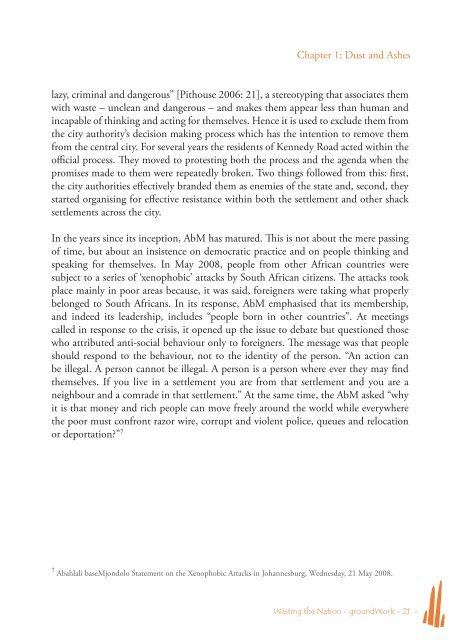Wasting the Nation.indd - Groundwork
Wasting the Nation.indd - Groundwork
Wasting the Nation.indd - Groundwork
You also want an ePaper? Increase the reach of your titles
YUMPU automatically turns print PDFs into web optimized ePapers that Google loves.
Chapter 1: Dust and Asheslazy, criminal and dangerous” [Pithouse 2006: 21], a stereotyping that associates <strong>the</strong>mwith waste – unclean and dangerous – and makes <strong>the</strong>m appear less than human andincapable of thinking and acting for <strong>the</strong>mselves. Hence it is used to exclude <strong>the</strong>m from<strong>the</strong> city authority’s decision making process which has <strong>the</strong> intention to remove <strong>the</strong>mfrom <strong>the</strong> central city. For several years <strong>the</strong> residents of Kennedy Road acted within <strong>the</strong>official process. They moved to protesting both <strong>the</strong> process and <strong>the</strong> agenda when <strong>the</strong>promises made to <strong>the</strong>m were repeatedly broken. Two things followed from this: first,<strong>the</strong> city authorities effectively branded <strong>the</strong>m as enemies of <strong>the</strong> state and, second, <strong>the</strong>ystarted organising for effective resistance within both <strong>the</strong> settlement and o<strong>the</strong>r shacksettlements across <strong>the</strong> city.In <strong>the</strong> years since its inception, AbM has matured. This is not about <strong>the</strong> mere passingof time, but about an insistence on democratic practice and on people thinking andspeaking for <strong>the</strong>mselves. In May 2008, people from o<strong>the</strong>r African countries weresubject to a series of ‘xenophobic’ attacks by South African citizens. The attacks tookplace mainly in poor areas because, it was said, foreigners were taking what properlybelonged to South Africans. In its response, AbM emphasised that its membership,and indeed its leadership, includes “people born in o<strong>the</strong>r countries”. At meetingscalled in response to <strong>the</strong> crisis, it opened up <strong>the</strong> issue to debate but questioned thosewho attributed anti-social behaviour only to foreigners. The message was that peopleshould respond to <strong>the</strong> behaviour, not to <strong>the</strong> identity of <strong>the</strong> person. “An action canbe illegal. A person cannot be illegal. A person is a person where ever <strong>the</strong>y may find<strong>the</strong>mselves. If you live in a settlement you are from that settlement and you are aneighbour and a comrade in that settlement.” At <strong>the</strong> same time, <strong>the</strong> AbM asked “whyit is that money and rich people can move freely around <strong>the</strong> world while everywhere<strong>the</strong> poor must confront razor wire, corrupt and violent police, queues and relocationor deportation?” 77 Abahlali baseMjondolo Statement on <strong>the</strong> Xenophobic Attacks in Johannesburg, Wednesday, 21 May 2008.<strong>Wasting</strong> <strong>the</strong> <strong>Nation</strong> - groundWork - 21 -
















